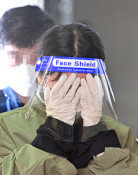Verification of security policy is the key to judging eligibility of Moon, Ban
Verification of security policy is the key to judging eligibility of Moon, Ban
Posted January. 16, 2017 07:01,
Updated January. 16, 2017 07:10
Verification of security policy is the key to judging eligibility of Moon, Ban
While visiting the South Korean Navy’s Second Fleet Command in Pyeongtaek, Gyeonggi Province on Sunday, former U.N. Secretary-General Ban Ki-moon said, “As the Korean Peninsula is almost in a quasi-war situation, the government needs to take the measure (decision to deploy the Terminal High Altitude Area Defense system),” in displaying his support of the move. Earlier on Friday, former Minjoo Party Chairman Moon Jae-in told an interview, “If the THAAD deployment issue is handed over to the next administration, public discussions including ratification by the National Assembly could be made, and we can have a chance to persuade China and Russia.” The frontrunner and the runner-up candidate in the presidential race are voicing different views on planned THAAD deployment.
The security of South Korean skies will not necessarily be assured from North Korea’s nuclear and missile threats just because a bastion of the THAAD system is deployed in Seongju, North Gyeongsang Province. However, THAAD deployment is directly linked to South Korea’s national security as a “lynch pin” to robustly connect the South Korea-U.S. Alliance, which is the backbone of the Republic of Korea’s national security. When meeting with a South Korean delegation on Dec. 20 last year, Michael Flynn, the national security adviser designate of the incoming Trump administration, confirmed that THAAD deployment symbolizes the solidity of the South Korea-U.S. alliance. Opposing THAAD designed to protect the U.S. troops stationed in South Korea from Pyongyang’s threat is an act that undermines the very foundation the Seoul-Washington alliance.
It makes us anxious to hear Moon’s demand that the THAAD deployment issue be handed over to the next administration again even though the incumbent administration has already agreed on THAAD deployment with Washington and selected the site for the system. Moon’s argument that he would persuade China and Russia, which is also nothing but idealism. In an interview, Moon claimed that the South Korea-U.S. alliance and the U.S. troops in South Korea are important to us, but they are also helpful to the U.S.’ global strategy. As the frontrunner in approval rating, Moon is obliged to give a responsible answer to the question of whether the incoming U.S. President Donald Trump, who values practical interest, will also share his view.
The public has the biggest expectation in ample experience in national security and diplomacy from the former U.N. chief. However, Ban has demonstrated little achievement, as evidenced by his saying while recalling his time as the UN chief on Sunday, “In reality, I had few chances to make contributions to reunification of the two Koreas.” “Economy could be revised, but there is no second chance for national security if it collapses,” Ban said, placing national security over economy as his top priority, but he must display a national security vision that can help assure the public.
The Lunar New Year’s Day is just 10 days away. Public opinions over presidential election tend to sway wildly ahead Chuseok (Korean Thanksgiving) one year before presidential election or Lunar New Year’s Day in the year of presidential election. Back in the 2007 presidential election, it was Chuseok holiday of 2006 when the approval ratings of then Grand National Party candidates Lee Myung-bak and Park Geun-hye reversed. Argument of pros and cons will be exchanged extensively over eligible presidential candidate to assume the responsibility for national security especially amid the current national security crisis. Candidates are urged to clearly display their respective national security policies ahead of the Lunar New Year’s holiday. Voters should also pay keen attention to presidential candidates’ views on national security. Time is running short for voters to adequately verify candidates’ views of national security that could determine the nation’s fate ahead of an expected early presidential election.







